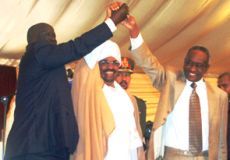Differences delay formation of Sudanese national unity govt
Sept 11, 2005 (KHARTOUM) — Serious differences have
emerged between Sudanese political parties trying to
form a government of national unity whose
announcement deadline has long passed, reliable
sources said Sunday here.
 The dispute between the ruling National Congress (NC)
The dispute between the ruling National Congress (NC)
Party and the former rebels of the SPLM/A is over the
control of energy ministry as part of a deal to share
power and wealth between the north and the south.
Without the formation of a new government, observers
here are now doubting the sincerity of the government
of President Omar al Bashir which signed the peace
deal that stopped the long civil war that had killed
over two million people.
Under a deal signed after two-and-a-half years of
negotiations in Kenya, the Sudanese belligerents
agreed to have a new constitution, and a power
sharing arrangement through a national unity
government.
The Sudanese government and the former rebels reached
the comprehensive peace deal in January, ending 21
years of a civil war between the north and south.
But the NC and SPLA/M have reportedly been locked in
a dispute over who would take charge the ministry of
energy and mining, posing an obstacle towards the
formation of the transitional government.
The NC and SPLA/M have been holding consultations on
who will take over control of the portfolio of the
influential ministry but they have yet to overcome
their differences, the sources added.
According to the source, the SPLA/M is insisting on
running the energy seat and is refusing to compromise
on this.
Some analysts said the government has to be forced to
stick to its agreement to share power and wealth with
the former southern rebels whose leader John Garang
died in a helicopter crash in July.
Garang’s deputy, Salva Kiir, replaced him both in the
movement and government, taking the post of first
vice president of the Sudan.
The new government was due to be announced on 9
August but Garang’s death delayed the process.
Kiir, who has in the past two days been visiting the
main southern city of Juba, is expected to return in
Khartoum on Sunday. He reportedly went to Juba to
have consultations with his SPLA/M colleagues on the
current hurdle towards a new Sudan.
Sudan, which has 560 million barrels in proven
reserves, currently produces 300,000 bpd and hopes to
raise its crude production to half a million bpd by
the end of 2005.
(PANA/ST)
